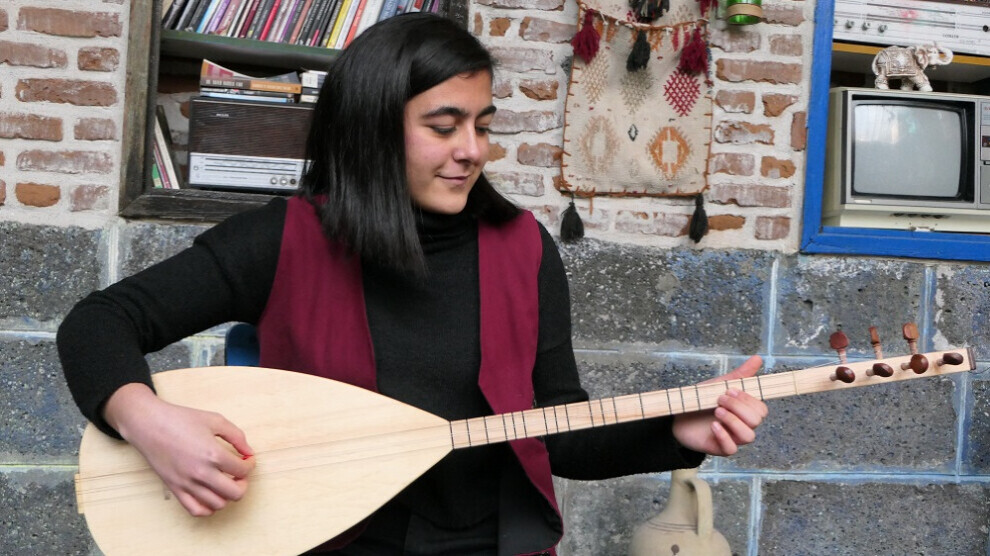Dengbêj of the Future: Herêm Nêrgîz
Herêm Nêrgîz was interested in Dengbêj at an early age in a musician family, and today she is taking Dengbêj and Baglama training by singing folk songs and strans.
Herêm Nêrgîz was interested in Dengbêj at an early age in a musician family, and today she is taking Dengbêj and Baglama training by singing folk songs and strans.

Dengbêjs have an important place in Kurdish oral literature. Many pains, love and massacres in Kurdistan history have been carried to the present day with the strans of dengbêjs. Evdalê Zeynikê, Botan Miri, Mem and Zîn are popular themes of the strans. The massacres, barbarism and heroism experienced by the Kurds are passed down from generation to generation thanks to dengbêjs. With each stran, the past sheds light towards the future.
The voice of Kurdish women in this ancient culture adds a distinct beauty to dengbêjs. Women dengbêjs have a more special place in Kurdish society. One of these female dengbêjs is the young Kurdish woman Herêm Nêrgîz. We can say that Herêm Nêrgîz (17) is an important stranbêj candidate. Herêm Nêrgîz was interested in being a dengbêj at an early age and has been studying Dengbêj and Baglama at the Music Academy for about two years.
EACH STRAN OF DENGBÊJS IS A HISTORY
Born in 2004 in Silvan district of Amed (Diyarbakır), Nêrgîz has been interested in music for 2 years. Noting that art is more valuable and meaningful when she does it with her own language, Nêrgîz said, "Language is not only a thing limited to speaking, it is also a means of being yourself and existence. Humans and society can be recognized and exist thanks to the language they have. Kurdish language is also like an endless stream in cultural and artistic senses.”
“I have been trying to learn dengbêj artistic activities for about two years. I am studying Dengbêj and Baglama at the Music Academy (MA). I have been receiving dengbêj and Baglama education. The strans I perform are not just artistic works, they are also like friends for me. Baglama and dengbêj art allow me to breathe. When I feel bad, I sing and play baglama and I travel to other worlds. Every stran of dengbêjs is a vivid Kurdish history. That's why I travel through history.”
INSPIRED BY MEYREMXAN, EYŞE ŞAN AND FATMA İSA
Nêrgîz stated that she started listen to dengbêj strans when she was 7 years old and explained her interest in music as follows: “We would always gather around our father at home and watch the Şevberka Dengbêjan show on Stêrk TV. My father was constantly talking to us about dengbêjs. I am always interested in female dengbêjs and I would like to sing stran like them in the future.”
“I would take Dengbêj Meyremxan, Eyşe Şan and Fatma Isa as an example for myself. My father used to tell us that 'Dengbêjs expressed whatever they went through with strans'. This caught my attention and I was curious about this art. I started to memorize dengbêj strans because of this curiosity and now I can sing them. My favorite stran was Meyremxan's 'Dotmamê' stran.”
"WOMEN DENGBEJS MADE WOMEN FREE IN KURDISH MUSIC"
Nêrgîz said, "Being Stranbêj gives me happiness. In my opinion, Kurdish music has come to the present day thanks to Dengbêj art. Immortal Kurdish dengbêjs have always kept the Kurdish history alive with their unique voices and strans. Dengbêj art is the greatest wealth of the Kurds. The voice of Kurdish women in it adds a distinct beauty this art. Women dengbêjs have a more special place in the Kurdish society. Kurdish women have had serious problems in Kurdish music.”
“Eyşe Şan and Meryem Xan are at the top of the stranbêjs who experienced these difficulties. They set an example for me when I study and read their lives. If they had not been successful under those difficult conditions, we would not be able to do our art freely today. In fact, they made women free in Kurdish music. They removed all barriers to Kurdish female musicianship. We are continuing our struggle in the field of music as their students."
'YOUNG PEOPLE SHOULD EMBRACE THEIR CULTURE'
Young Kurdish dengbêj Herêm Nêrgîz pointed out that young people should protect their own culture: "Today, young people do not value dengbêj art and they approach it as if dengbêj art is a foreign phenomenon. I talk to my friends about dengbêj art as much as I can and tell them what I know.”
Nêrgîz added: “Dengbêj is a great art for me. All young people should embrace art and the culture of dengbêj. Because everyone can be recognized for their own art and culture. Those who do not know their own history, culture and art do not have a public memory. This culture must be kept alive."